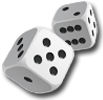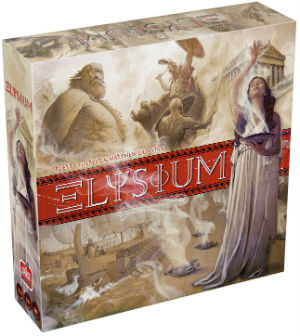



play board games
Board game reviews, strategy tips & session reports
Elysium Board Game Review
 Stats:
Stats:
No. of players: 2-4
Amount of time to play: 60-90 min
Age requirements: 8+
Set-up time: 5 min
Elysium is a card-drafting game. Many of the cards you draft provide powers until you bank them for VPs. You score VPs by creating sets or runs of your banked cards.
Elysium Rules Description:
In Elysium you are a demigod trying to claim your place in Olympus. You write Legends to gain fame and score VPs.
Elysium lasts five epochs (or rounds) and each epoch is divided into four phases, Awakening, Actions, Writing of the Legends and the End of an Epoch. First choose five of the eight family decks you want to play with. Then you start the game with four gold and a player board.
At the start of the game and each epoch you place seven to thirteen cards (depending on the number of players) in the Agora. These are the cards that are available to draft for the epoch. If any cards from the last epoch are in the Agora you put them in the discard pile before adding the new cards.
Much of the game takes place in the Actions phase. During it you draft cards and may use the power of some of your cards. You start each epoch with four colored columns (red, blue, green and yellow). The top right corner of the cards has one or two of those colors. In order to draft a card you must have the column(s) that match the color(s) on that card. After you draft a card you must remove one column from your player board. The column you remove does not have to match the color(s) on the card you drafted. If you are unable to draft a card you get a citizen. All drafted cards go above your player board in the Domain.
Each epoch you will draft three cards and one quest. Quests determine player order for the next round, get you some gold, tells you how may legends you can write (more on that in a bit) and might get you VP tokens. Quests require a column of a certain color to draft and if you don’t have the required column you take any quest but flip it face down. This puts you last in turn order the next round and gives just one gold and one legend to write.
During the Actions phase, some cards in your Domain have powers you can trigger. The powers vary from getting you gold or VP, making your opponents discard gold or VP or letting you score more VPs by meeting conditions at the end of the game. Each family deck has a different specialty. Different cards also trigger at different times and in different ways. Some powers activate as soon as you take the card, others trigger once but you decide when and some may be used once each epoch. Some cards even trigger in the next phase.
When you Write the Legends, you take cards from your Domain and put them into your Elysium (below your player board). Each family deck is one color and has cards numbered one to three. When you put a card in your Elysium you may no longer use its power and it costs gold equal to the card’s level. You want to create sets runs. You can make as many sets and runs as you like but the bigger they are the more VPs you score. Citizens are wild cards and can be added to any set or run. They cost the same amount as the card you are using it represent. Just be aware that each citizen in your Elysium at the end of the game is worth minus two VPs.
The player with the biggest set of each number gets a bonus token worth VPs at the end of the game. It can be stolen and exchanged between players until someone creates a set of five. The first two runs of each family that are made get you five and two VPs respectively.
At the End of the Epoch you get your columns back untap cards that are used once per Epoch and move the Epoch marker up the track.
Once the fifth Epoch is over you score points based on the cards in your Elysium. Cards in your Domain do not score. For each run of 2 cards you get 3 VPs. Runs with all 3 levels get you 6 VPs. A set of 2,3,4, or 5 cards scores you 2,4,8,12 VPs respectively. Then you add any bonuses from cards in your Elysium with end game powers, your bonus tokens and subtract points for Citizens. The player with the most VPs wins.
Quick Review of Elysium:
Elysium is a fun, card-drafting game. In which you must pay attention and react to your opponents’ tableau to win.
The components for this game are excellent. The art is great, the rules are well written and the chits durable. There is a guide that explains all the different cards. And the insert is fantastic.
I really like how you gain cards in this game. Using the columns to draft but not having to spend the column(s) in the card’s cost is interesting. It creates some tough choices especially when you add the quests into it.
I also like how the different family decks play differently and focus on different things. It adds replay value and forces you to vary your strategy. It also lets you tailor the game to you and your group’s taste. Making card combinations that can get you more VPs, gold or cards is fun too. And the variety in the family decks gives you lots to explore.
Be aware, Elysium can have a decent amount of downtime, especially when players are learning all the cards. It only gets worse if you have a player that struggles with analysis paralysis. And the theme is fairly pasted on. The great art helps a bit but at its heart this game is an abstract.
Elysium feels like a mix of 7 Wonders and Splendor. If your group likes those games and is looking for a fun card-drafting game, pick this up. If you read the overview and this sounds interesting it is definitely worth trying out.
Score and synopsis: (Click here for an explanation of these review categories.)
Strategy 4 out of 6
Luck 4 out of 6
Player Interaction 4 out of 6
Replay Value 5 out of 6
Complexity 4 out of 6
Fun 4 out of 6
Overall 4 out of 6

Leave a Reply